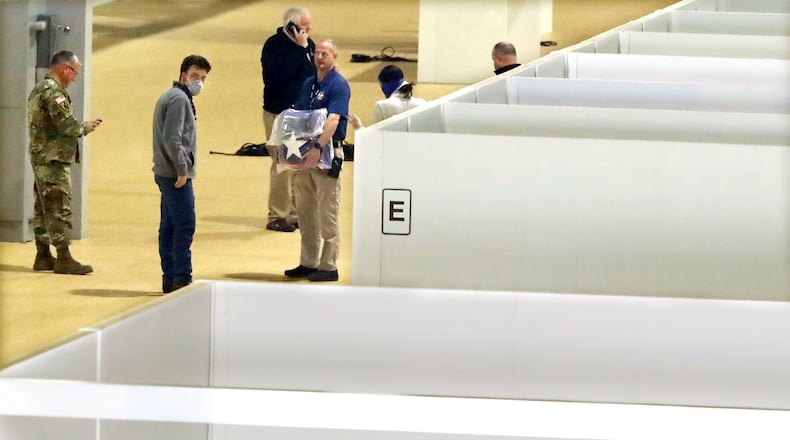Georgia officials are racing to expand hospital capacity to cope with soaring numbers of coronavirus cases, unveiling plans Friday to reopen a makeshift medical facility at the sprawling convention center in Atlanta and other efforts to add more beds.
Gov. Brian Kemp's office said the temporary hospital at the Georgia World Congress Center, which opened in April and shuttered a month later, will soon be reactivated to relieve healthcare systems struggling with rising numbers of coronavirus patients.
The state also plans to strike a deal with a hospital system, believed to be Piedmont Healthcare, to add roughly 100 intensive care and surgical units to Georgia's medical infrastructure.
The decisions reflect Georgia's worsening struggle with the disease. Nearly 4,500 new cases of the COVID-19 were reported on Friday, a new daily record, and roughly 80% of the state's hospital beds were filled, a sign of the strain on the healthcare network.
Kemp's spokeswoman, Candice Broce, said the measures were partly driven by hospital chief executives who urged the governor to allow them to continue with elective surgeries that help finance their systems and prevent furloughs.
His office said that mobile hospital units at Albany, Gainesville, Macon and Rome will remain in place, and that the state also plans to pay for additional medical staffers at dozens of healthcare and long-term care facilities around the state.
Kemp’s announcement comes as the number of current hospitalizations surges well beyond its peak of about 1,900 in April, when a statewide shutdown curbed the number of new cases sharply.
The governor has steadily rolled back coronavirus restrictions since then, even as public health experts and other critics warn that relaxing the limits could trigger more cases of the disease.
He's cast his rollback as a measured approach and urged Georgians to practice social distancing, follow safety guidelines and wear masks. But he's stopped short of requiring face coverings, and said mandates adopted by Atlanta and other cities are "unenforceable."
As the state reopened its economy, scientists projected that new cases and hospitalizations would inevitably tick upward. It's only recently become clear how sharply they've increased.
Caseloads began to inch up in early June and are now rising at an accelerating pace. More than 2,300 people are currently hospitalized for COVID-19, according to the most recent figures available. The share of ICU beds available to treat those who are critically ill has shrunk to single digits in some regions.
This new wave of patients is younger, and typically do not have severe diabetes, lung disease, obesity and other problems that would make them more prone to becoming critically ill or dying. Their stays in critical care also tend to be shorter.
Whether they’ll overwhelm Georgia hospitals remains an open question.
This younger, healthier population is behind the COVID-19 surge in other Sun Belt states such as Arizona, Florida and Texas. Still, staff at some major hospitals in those states report they’re running out of space. Dozens of Florida ICUs report they have no more open beds.
Kemp's office said the contract with the hospital system, which officials did not name, was still being negotiated. His aides didn't provide an overall cost of the new measures. Records show the initial construction of the medical facility at the GWCC in April cost an estimated $21.5 million.
That 200-bed hospital was erected to handle what was expected to be an influx of patients suffering from mild to moderate symptoms of COVID-19. Instead, by the time it closed in May, it had only treated 17 patients.
At that time, the closure was seen as an indication that Georgia had a handle on the disease. The rate of hospitalizations from the disease was falling, and the number of daily confirmed cases had effectively plateaued.
And optimistic convention center leaders outlined plans to resume hosting events, producing a 23-page document that included installing new touchless payment devices, plexiglass dividers and electrostatic sprayers to sanitize the complex.
The center is at the heart of a mini-city that links downtown hotels, State Farm Arena and Mercedes-Benz Stadium. It's a major driver of metro Atlanta's economy, with an estimated economic impact that tops $1 billion.
The complex has largely been vacant since March, with the exception of the makeshift hospital, a few small meetings and an area where elections officials counted absentee ballots.
Only a fraction of the convention center is expected to be used for patients, said Jennifer LeMaster, the GWCC’s chief administrative officer.
The beds are likely to go in a portion of a Building A exhibition hall that was used last time. She said the beds were moved into storage and the space was mothballed in sterilized condition “exactly how they left it.”
A body building event with a couple hundred attendees is scheduled for elsewhere in the same building this weekend but isn’t expected to get in the way of the state’s plans, which may not be rolled out right away, she said.
And the next major event booked at the once-bustling center isn't until mid-November, when a super computing convention is slated to take up most of the campus.
About the Author
The Latest
Featured




